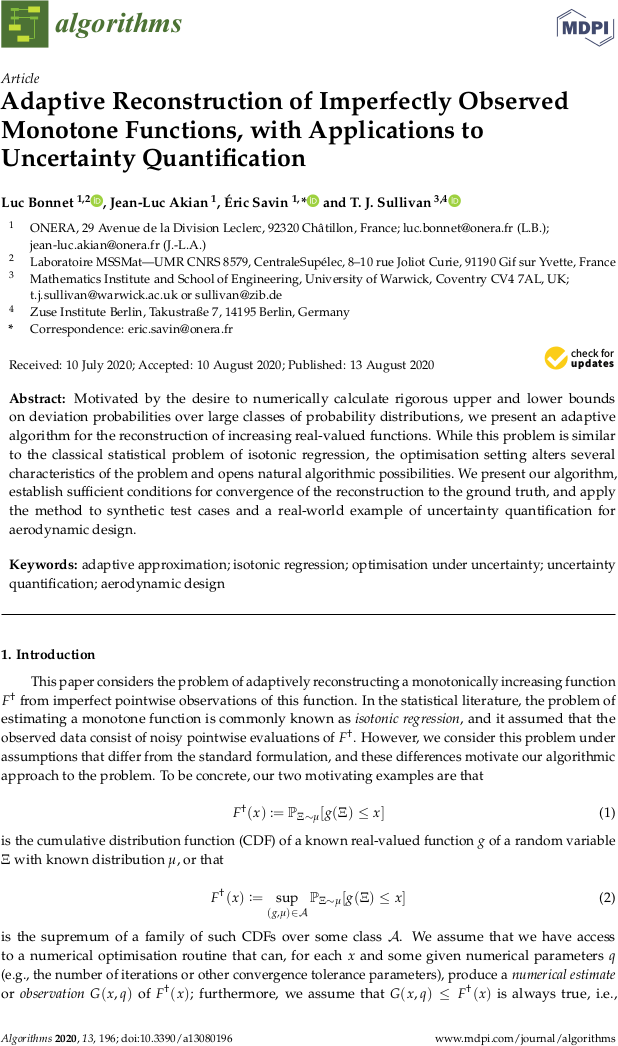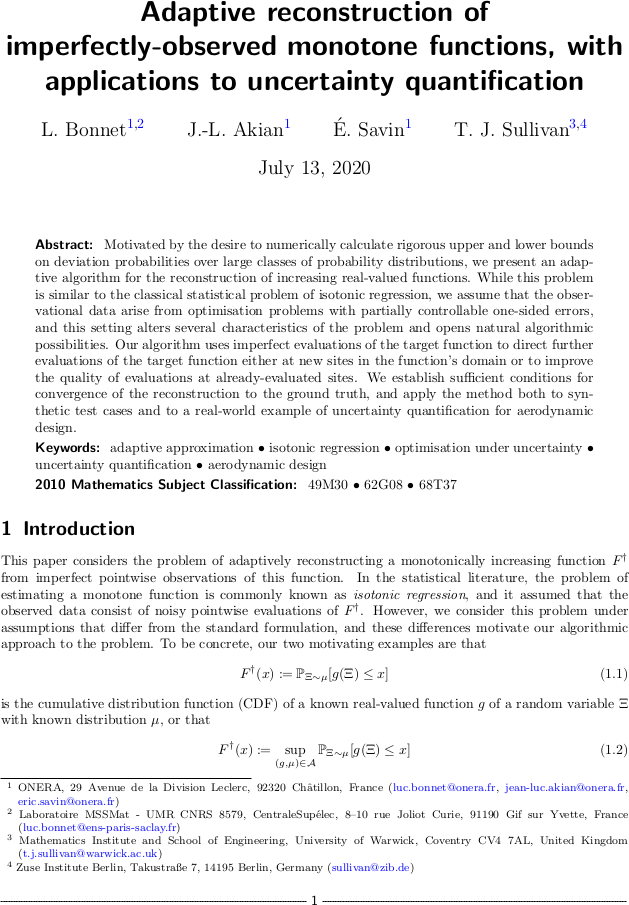#daad

Adaptive reconstruction of monotone functions in special issue of Algorithms
The paper “Adaptive reconstruction of imperfectly-observed monotone functions, with applications to uncertainty quantification” by Luc Bonnet, Jean-Luc Akian, Éric Savin, and myself has just appeared in a special issue of the journal Algorithms devoted to Methods and Applications of Uncertainty Quantification in Engineering and Science. In this work, motivated by the computational needs of the optimal uncertainty quantification (OUQ) framework, we present and develop an algorithm for reconstructing a monotone function \(F\) given the ability to interrogate \(F\) pointwise but subject to partially controllable one-sided observational errors of the type that one would typically encounter if the observations would arise from a numerical optimisation routine.
L. Bonnet, J.-L. Akian, É. Savin, and T. J. Sullivan. “Adaptive reconstruction of imperfectly-observed monotone functions, with applications to uncertainty quantification.” Algorithms 13(8):no. 196, 21pp., 2020.
Abstract. Motivated by the desire to numerically calculate rigorous upper and lower bounds on deviation probabilities over large classes of probability distributions, we present an adaptive algorithm for the reconstruction of increasing real-valued functions. While this problem is similar to the classical statistical problem of isotonic regression, the optimisation setting alters several characteristics of the problem and opens natural algorithmic possibilities. We present our algorithm, establish sufficient conditions for convergence of the reconstruction to the ground truth, and apply the method to synthetic test cases and a real-world example of uncertainty quantification for aerodynamic design.
Published on Monday 17 August 2020 at 12:00 UTC #publication #algorithms #daad #ouq #isotonic #bonnet #akian #savin

Adaptive reconstruction of monotone functions
Luc Bonnet, Jean-Luc Akian, Éric Savin, and I have just uploaded a preprint of our recent work “Adaptive reconstruction of imperfectly-observed monotone functions, with applications to uncertainty quantification” to the arXiv. In this work, motivated by the computational needs of the optimal uncertainty quantification (OUQ) framework, we present and develop an algorithm for reconstructing a monotone function \(F\) given the ability to interrogate \(F\) pointwise but subject to partially controllable one-sided observational errors of the type that one would typically encounter if the observations would arise from a numerical optimisation routine.
Abstract. Motivated by the desire to numerically calculate rigorous upper and lower bounds on deviation probabilities over large classes of probability distributions, we present an adaptive algorithm for the reconstruction of increasing real-valued functions. While this problem is similar to the classical statistical problem of isotonic regression, we assume that the observational data arise from optimisation problems with partially controllable one-sided errors, and this setting alters several characteristics of the problem and opens natural algorithmic possibilities. Our algorithm uses imperfect evaluations of the target function to direct further evaluations of the target function either at new sites in the function's domain or to improve the quality of evaluations at already-evaluated sites. We establish sufficient conditions for convergence of the reconstruction to the ground truth, and apply the method both to synthetic test cases and to a real-world example of uncertainty quantification for aerodynamic design.
Published on Monday 13 July 2020 at 10:00 UTC #preprint #daad #ouq #isotonic #bonnet #akian #savin
Luc Bonnet visits the UQ Group
It is a pleasure to announce that Luc Bonnet will be joining the UQ research group for a three-month visit funded by the German Academic Exchange Service (DAAD), with effect from 1 September 2019. He will be working on the application of optimal uncertainty quantification methodology to problems in aerodynamics and aircraft design.
Published on Sunday 1 September 2019 at 09:00 UTC #group #daad #ouq #bonnet